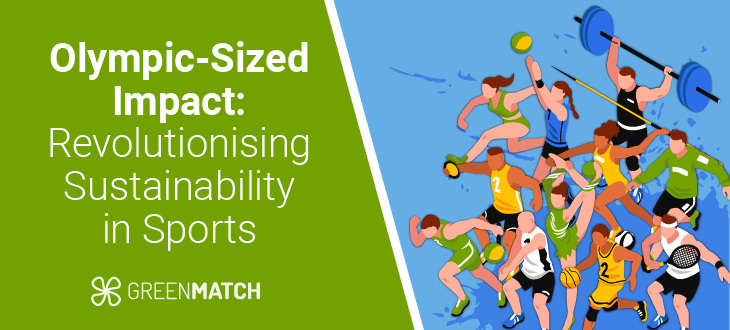- GreenMatch
- Blog
- Sustainability in Sports
Olympic-Sized Impact: Revolutionising Sustainability in Sports


- Athlete and spectator travel heavily contribute to carbon footprints.
- A typical sports game can produce 30 to 40 tons of solid waste.
- Upgrading to Olympic-standard insulation could reduce sports venue heating energy use by up to 45%.
- UK events could enhance public transport access and promote cycling to reduce emissions.
Major sporting events captivate millions worldwide, yet their environmental footprint often goes unnoticed. Sports generate significant carbon emissions and waste from stadium construction to fan travel.
However, a green revolution is sweeping through athletics, transforming how events are organised and experienced.
Sustainability in sports has become more than a buzzword; it's now a crucial aspect of event management. Organisations recognise their responsibility to minimise negative impacts while maximising positive contributions to society and the environment.
This article explores how major sporting events, notably the Olympics, are setting new benchmarks for sustainability and how these initiatives can inspire broader changes in the sports industry.
- Environmental Challenges in Sports
- Paris 2024 Olympics: Setting New Benchmarks
- Beyond the Olympics: Industry-Wide Sustainability Trends
- Key Statistics and Facts
- Innovative Solutions for Greener Games
- Lessons for Local Sports Organisations
- Future Trends in Sustainable Sports
- Potential Long-Term Impacts on Sustainability in Sports
- Looking Ahead on Sustainability in Sports
Carbon Footprint of Major Sporting Events
The global football industry produces over 30 million tonnes of carbon dioxide annually, comparable to Denmark's total emissions. Recent major events have had significant carbon footprints:
- 2022 FIFA World Cup in Qatar: Approximately 3.63 million tonnes of CO2 equivalent (tCO2e).
- The 2016 Rio Olympics and 2018 Russia World Cup resulted in 3.6 and 2.16 million tons of carbon dioxide, respectively.
Stadium Construction
- For the 2022 FIFA World Cup, constructing six permanent stadiums in Qatar generated an estimated 1.6 million tonnes of CO2e emissions.
- This figure is approximately three times higher than the predicted emissions for the entire UEFA EURO 2024 tournament.
Fan Travel
Fan travel is consistently identified as the most significant contributor to carbon emissions in sports:
- UEFA EURO 2024, it's projected that nearly 70% of the tournament's estimated 490,000 tCO2e emissions came from transport, with fan travel being the major component.
- The 2024/25 season of European club football (with 36 teams) was projected to generate 480,717 tonnes of CO2e from fan and team travel alone.
- A study by Trainline found that Premier League fans travelling to away matches by car collectively generate about 4,000 tonnes of CO2 emissions per season.
- Analysis of various tennis tournaments showed that fan travel accounted for 88% of carbon emissions for ATP men's tennis tournaments.
- At cricket's T20 Finals Day at Edgbaston, 79% of emissions were caused by staff and spectator travel.
These figures highlight the significant environmental impact of sports, particularly in terms of carbon emissions from fan travel and stadium construction.
However, it's worth noting that many sports organisations now recognise this issue and implement strategies to reduce their carbon footprint, such as using existing stadiums, promoting public transportation, and investing in carbon offset programs.
Environmental Challenges in Sports
Sports events face numerous environmental challenges, each contributing to the ecological footprint. Understanding these challenges is the first step toward implementing effective sustainability in sports measures.
Energy Consumption
Powering stadiums, broadcasting, and related infrastructure require vast amounts of energy. For example, the energy demand for lighting, cooling, and heating during events can be immense.
According to a study by Eaton, stadiums have peak energy usage, with demand increasing four to fivefold on match days compared to non-event days.
This high energy consumption often relies on non-renewable sources, contributing significantly to carbon emissions. For instance, the 2020 Tokyo Olympics had a total carbon footprint of 1.96 million tCO2e, with a significant portion attributed to energy use.
Waste Generation
Large crowds produce substantial waste, often improperly managed. Events like the FIFA World Cup and the Olympics generate enormous amounts of waste, including food packaging, plastic bottles, and promotional materials.

The 2012 London Olympics generated 61,000 tons of waste, but through rigorous recycling and reuse programs, 99% of this waste was diverted from landfills. However, many events still need help with effective waste management, leading to environmental pollution and increased landfill use.
Transportation Emissions
Athlete and spectator travel contributes heavily to carbon footprints. Major international events attract visitors from around the globe, leading to significant air travel emissions.
The International Olympics Committee estimated that travel-related emissions were a major contributor to the carbon footprint of the Tokyo 2020 Olympics. Encouraging public transportation, carpooling, and virtual spectating can help mitigate these emissions.
Habitat Disruption
The construction of new venues can disturb local ecosystems. Building large-scale sports facilities often requires clearing land, which can lead to habitat destruction and biodiversity loss.
For example, constructing new stadiums for the FIFA World Cup in Qatar involved significant land development, impacting local wildlife and ecosystems. Sustainable construction practices and the use of existing infrastructure can minimise these impacts.
Paris 2024 Olympics: Setting New Benchmarks
The upcoming Paris 2024 Olympics is a landmark event for sustainability in sports. The organisers have set ambitious goals to halve carbon emissions compared to previous Games.
Using 95% existing or temporary venues, they aim to minimise construction impacts and align with the Paris Agreement on climate change. These efforts are not just about reducing emissions but also about setting a precedent for future sporting events.
- Sustainable Venues: Paris' use of existing facilities minimises environmental impact. The UK events could adopt similar strategies, repurposing existing structures or designing multi-use venues.
- Green Transport: Paris plans 415km of cycle paths linking Olympic venues. UK events could enhance public transport access and promote cycling to reduce emissions.
- Eco-Friendly Catering: Paris 2024 aims to halve the carbon footprint of 13 million meals served. UK events could prioritise local, plant-based options to cut food-related emissions.
- Innovative Cooling: Paris Village's geothermal cooling system was initially planned but has now switched to regular ACs due to practicality concerns. UK venues could explore the use of geothermal cooling for energy-efficient climate management.
- Waste Reduction: Paris' focus on circular economy principles could inspire UK events to implement comprehensive recycling and waste reduction strategies.
- Accessibility: Paris' focus on accessibility, including improved disabled access to public transport, offers a blueprint for inclusive sustainability. UK sports events could prioritise similar measures, ensuring environmental initiatives benefit all community members.
Beyond the Olympics: Industry-Wide Sustainability Trends
While the Olympics often set the benchmark for sustainability in sports, other major leagues and teams are also making significant strides. These organisations' adoption of sustainable practices showcases the broader industry's commitment to environmental responsibility.

However, UK Sport should prioritise environmental sustainability as part of its mission to power positive change. The organisation should aim for high-performance sports to have a net positive environmental impact by 2040, with an interim goal of achieving net zero by 2030.
UK Sport supports National Governing Bodies in calculating their carbon footprints and developing sustainability in sports action plans.
Moreover, the Premier League itself needs to demonstrate stronger moral leadership by addressing issues like the use of domestic flights by clubs and the lack of a comprehensive sustainability strategy.
- Materials Passport System: Implement a comprehensive tracking system for all materials used in construction and event operations, ensuring maximum post-game reuse or recycling.
- Modular Design: Develop standardised, reusable modular components for temporary structures that can be easily disassembled and reassembled for future events or repurposed for community use.
- Compostable Merchandise: Ensure all event merchandise and packaging are fully compostable or biodegradable.
- Hydrogen-Powered Fleet: Introduce a fleet of hydrogen fuel cell vehicles for athletes and official transportation, showcasing zero-emission technology.
- Smart Traffic Management: Implement AI-driven traffic systems to optimize routes and reduce congestion, minimising emissions from spectator travel.
- Pollinator Pathways: Create a network of pollinator-friendly green spaces connecting sports venues and supporting local ecosystems.
Key Statistics and Facts
- Switching to LED lighting in UK sports venues could reduce associated emissions by up to 65%.
- Implementing Olympic-style smart energy systems in UK cities could reduce urban energy consumption by 20-30%.
- If 10% of UK football fans adopted 3 new sustainable habits, it could reduce carbon emissions by an estimated 500,000 tonnes annually.
- Forest Green Rovers, the world's first carbon-neutral and vegan football club, is building the world's greenest football stadium.
- The 2012 London Olympics created 61,000 tons of waste, but 99% was recycled or reused.
Innovative Solutions for Greener Games
Fortunately, sports organisations are implementing creative solutions to address these challenges:
1. Sustainable Venue Design
Modern stadiums incorporate eco-friendly features from the ground up. For example, Forest Green Rovers, dubbed the world's greenest football club, is constructing a wooden stadium.
This innovative approach significantly reduces carbon emissions compared to traditional concrete structures.
Other sustainable design elements include:
- Solar panels and wind turbines for renewable energy generation
- Rainwater harvesting systems
- Green roofs to improve insulation and biodiversity
- LED lighting to reduce energy consumption
Implementing these features can yield impressive results. Switching to LED lighting in UK sports venues could slash associated emissions by up to 65%.
2. Smart Energy Management
Adopting Olympic-style smart energy systems in UK cities could reduce urban energy consumption by 20-30%.
These systems optimise resource use through the following:
- AI-powered analytics for efficient energy distribution
- Real-time monitoring of consumption patterns
- Automated controls for lighting and climate systems
3. Sustainable Transportation
Transportation remains a significant contributor to sports-related emissions.
Innovative approaches include:
- Encouraging public transit use by integrating ticket prices with local transport fares
- Providing electric shuttle services between venues and transport hubs
- Promoting cycling by offering secure bike parking and rental services
Virtual spectating technologies are also gaining traction. If 20% of UK sports fans opted for immersive virtual viewing experiences, event-related travel emissions could be cut by an estimated 15%.
4. Waste Reduction and Recycling
Effective waste management is crucial for sustainable sports events. Strategies include:
- Eliminating single-use plastics
- Implementing comprehensive recycling programs
- Composting organic waste from food vendors
The 2012 London Olympics set a high bar, recycling or reusing 99% of the 61,000 tons of waste generated.
5. After Conservation
Water-saving initiatives are becoming increasingly important:
- Installing low-flow fixtures in stadiums
- Using drought-resistant grass species for playing fields
- Implementing smart irrigation systems
Adopting Olympic village-inspired water systems in new UK housing developments could reduce household water consumption by 30%.
6. Fan Engagement
Engaging fans in sustainability efforts can have a substantial impact. If 10% of UK football fans adopted three new sustainable habits, it could reduce carbon emissions by an estimated 500,000 tonnes annually.
Initiatives include:
- Gamification apps rewarding sustainable behaviours
- Educational campaigns on environmental issues
- Encouraging fans to offset their travel emissions
Lessons for Local Sports Organisations
While Olympic-scale initiatives may seem out of reach for smaller organisations, many strategies can be adapted for local use:
- Energy Efficiency: Upgrade to LED lighting and smart energy management systems. This could reduce venue heating energy use by up to 45%.
- Sustainable Procurement: Source locally-produced, organic food for concessions and use eco-friendly promotional materials.
- Green Transportation: Encourage carpooling and provide information about public transport options.
- Waste Management: Implement recycling stations and eliminate single-use plastics.
- Community Engagement: Community engagement is crucial for promoting sustainability. o can educate and involve local communities by organising sustainability-themed events and competitions.
Future Trends in Sustainable Sports
Exploring upcoming trends and innovations reveals the potential long-term impacts of current sustainability initiatives. These trends promise to enhance the environmental performance of sports events and offer significant cost savings and operational efficiencies.
Smart Stadiums and IoT Integration
Smart stadiums with Internet of Things (IoT) technology are revolutionising the sports industry. These venues use sensors and data analytics to optimise energy use, monitor waste management, and enhance fan experiences.
For example, smart lighting systems can adjust brightness based on real-time needs, reducing energy consumption by up to 30%. Implementing such technologies across UK sports venues could save millions of pounds annually in energy costs.
Virtual and Augmented Reality (VR/AR)
Virtual and augmented reality technologies are transforming both training and fan engagement. R training programs allow athletes to practice in realistic, simulated environments, reducing the need for physical travel and associated emissions.
AR, on the other hand, enhances the in-stadium experience by providing real-time statistics and interactive elements. These technologies improve performance and engagement and contribute to sustainability by minimising resource use.
Advanced Sports Streaming
Digitalisation is revolutionising sports broadcasting, focusing on providing personalised experiences and maintaining high streaming speeds. 3D technologies and 4K resolution enhance stream quality, while over-the-top (OTT) platforms allow fans to watch on multiple devices.
This reduces the need for physical attendance, reducing travel-related emissions. For example, Swiss startup GlobalM optimises event organisation with a software-defined video network that allows secure and reliable streaming, reducing latency and costs.
Eco-Friendly Sportswear
The sportswear industry is also embracing sustainability. Brands are developing eco-friendly sportswear made from recycled materials and sustainable fabrics. This reduces the environmental impact of production and appeals to environmentally conscious consumers.
For instance, switching to sustainable materials can reduce carbon emissions by up to 50% compared to conventional fabrics.
Carbon-Neutral Events
The concept of carbon-neutral events is gaining traction. Organisers are increasingly committed to offsetting the carbon footprint of their events through various measures, such as investing in renewable energy projects and supporting reforestation initiatives.
The 2024 Paris Olympics, for example, aims to halve carbon emissions compared to previous Games and achieve carbon neutrality. Such initiatives benefit the environment and enhance the reputation of the organising bodies.
Financial Benefits of Sustainability
Adopting sustainable practices can lead to significant cost savings. For example, energy-efficient lighting and smart energy management systems can reduce operational costs by up to 45%.
Similarly, waste reduction and recycling programs can lower disposal costs and generate revenue from recycled materials. According to a report by the Carbon Trust, UK sports venues could save up to £100 million annually by implementing energy efficiency measures and reducing waste.
Potential Long-Term Impacts on Sustainability in Sports
The long-term impacts of current sustainability initiatives in sports are profound. y adopting sustainable practices, sports organisations can:
- Reduce their carbon footprint and contribute to global climate goals.
- Enhance their reputation and attract environmentally conscious fans and sponsors.
- Achieve cost savings through energy efficiency and waste reduction.
- Foster innovation and set new standards for sustainability in the industry.
Looking Ahead on Sustainability in Sports
The Paris 2024 Olympics set a new benchmark for sustainability in the challenges of organising a major international event in an era of climate change. While the original vision of the "greenest Games in Olympic history" may have been compromised, the event remains committed to setting new standards for sports sustainability.
The race to sustainability isn't a sprint; it's a marathon. With collaboration, innovation, and determination, the sporting world can create a lasting legacy far beyond the playing field. In this game, everyone wins - athletes, fans, and our planet.
Sustainability in sports is no longer optional; it's necessary for the industry's future. By embracing innovative solutions and engaging fans in environmental efforts, sports organisations can significantly reduce their environmental footprint while inspiring millions to adopt more sustainable lifestyles.
As we look towards future sporting events, we aim to create thrilling competitions that celebrate human achievement without compromising our planet's health. Through collective effort and continued innovation, sustainable sports can become a powerful force for positive environmental change.

Inemesit is a seasoned content writer with 9 years of experience in B2B and B2C. Her expertise in sustainability and green technologies guides readers towards eco-friendly choices, significantly contributing to the field of renewable energy and environmental sustainability.
We strive to connect our customers with the right product and supplier. Would you like to be part of GreenMatch?

- Carbon Footprint of Major Sporting Events
- Environmental Challenges in Sports
- Paris 2024 Olympics: Setting New Benchmarks
- Beyond the Olympics: Industry-Wide Sustainability Trends
- Key Statistics and Facts
- Innovative Solutions for Greener Games
- Lessons for Local Sports Organisations
- Future Trends in Sustainable Sports
- Potential Long-Term Impacts on Sustainability in Sports
- Looking Ahead on Sustainability in Sports
